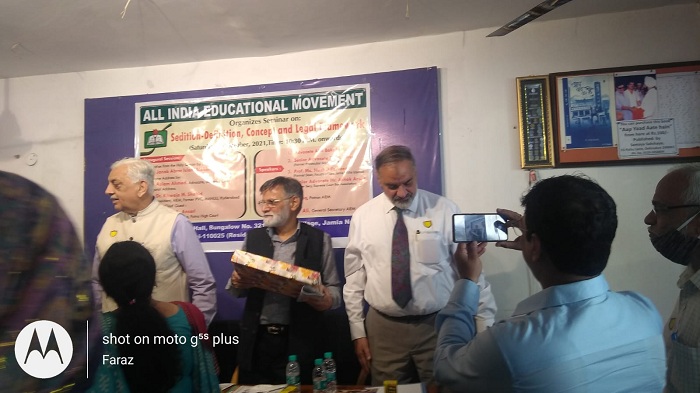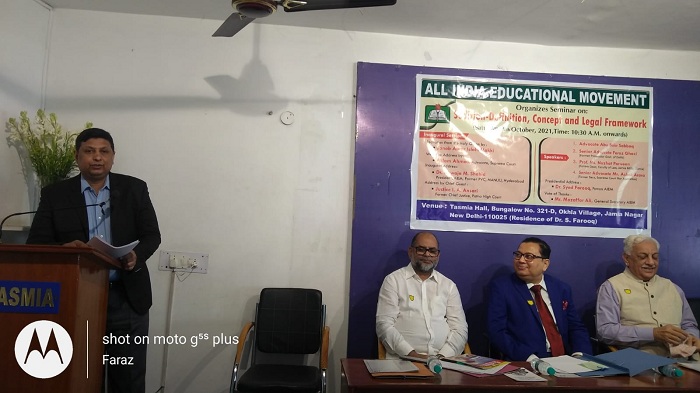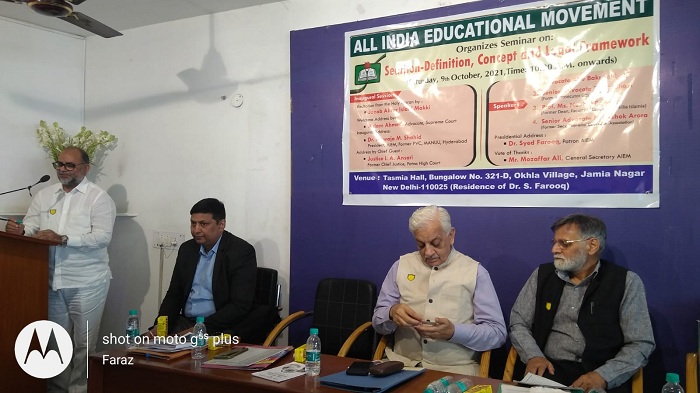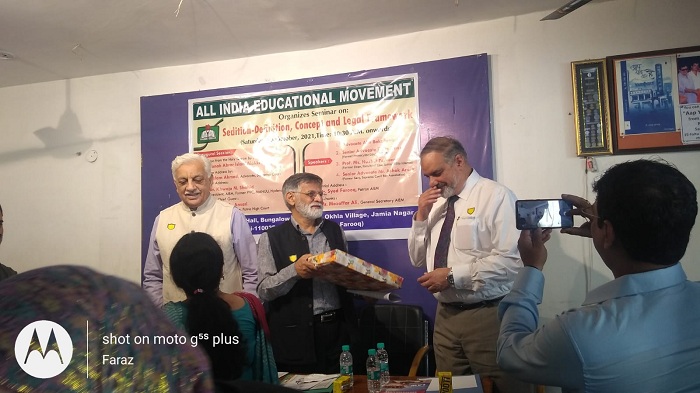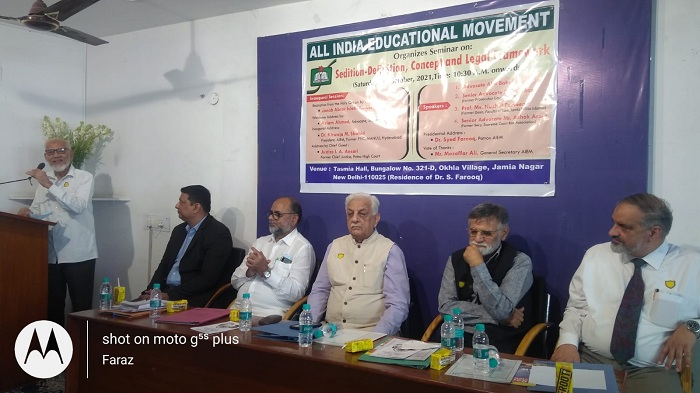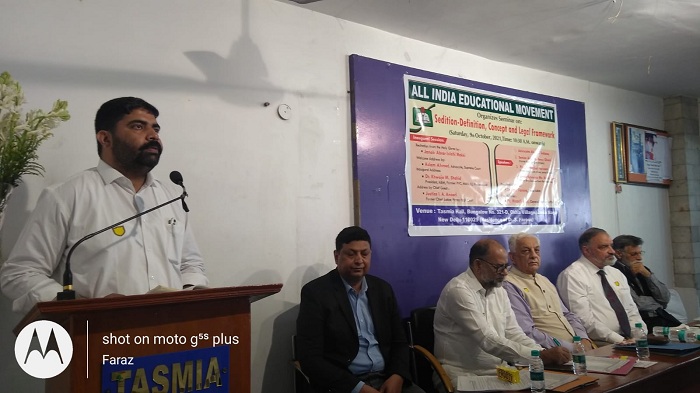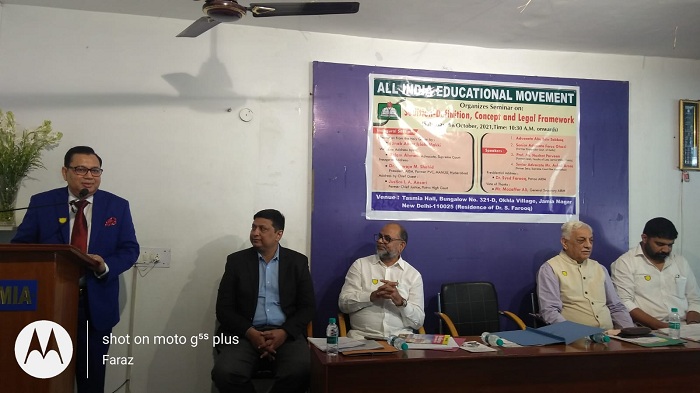Seminar on Sedition-Definition, Concept and Legal Framework
(Saturday, 9th October, 2021)
Tasmia Hall, Okhla Village, Jamia Nagar, New Delhi
New Delhi – Report of the All India Educational Movement (AIEM) organised a SEMINAR on the theme “Sedition-Definition, Concept and Legal Framework” held on 9 October 2021
AIEM, as part of its continuing legal awareness seminar, organised a seminar on the subject Sedition-Definition, Concept and Legal Framework which was held on Saturday 9 October 2021 at Tasmia Hall, D-321, Okhla, New Delhi. The seminar was attended by distinguished lawyers, media persons, academicians who spoke on the subject and the importance of right of speech as to evaluation and criticism of any aspect of a policy or otherwise as part of basic human desire to air their views without fear or favour and the right to disagree. The program started with the recitation of holy Quran by eminent scholar of Islam and member of AIEM Janab Abrar Islahi Makki. He recited verses of holy Quran wherein the core values promoting and exhorting values such as upholding and speaking the truth without fear are stressed as well as diversity of human beings (diversity in thought and approaches) being divine blessing so that humanity may recognise one another.
Following the recitation from holy Quran, all distinguished guests were welcomed by advocate Aslam Ahmed, advocate, Supreme Court who is also a member of AIEM. The speeches were moderated by Advocate Aslam Ahmed, member of AIEM. Aslam introduced the audience to the theme and subject and invited the speakers one after the other to deliberate.
The inaugural address was given by Khwaja Shahid Sb, president of AIEM. Whilst deliberating on the subject and circumstances, he asked of himself and the audience if the law relating to sedition needs any change and whether changes to law should precede a social demand or should be a consequence of a social demand.
Hon’ble Justice I.A.Ansari (retired Chief Justice of Patna High Court) was the Chief Guest and he addressed the gathering and made the address interesting by approaching the issue from various angles and sharing his experiences as a judge. He cited from movie pink about a sexual assault trial and that silence of a woman could never be an assent. He then highlighted Kanhaiya Kumar’s case and observed that at the initial stage when bail is to be granted, a judge should refrain from observations that would befit a final finding and not before for it is well possible that trial it might be observed that a particular fact is not proven (although it is assumed by prosecution at the initial stage) and thus the judge should not pre judge issues. He also mentioned that if a judge is not fearless, his /her obituary as a judge should be written for he is no more a judge but could be anyone. He also stressed on the importance of qualitative and quantitative analysis of forensic evidence. A qualitative analysis is one that confirm the role of a substance but it is quantitative analysis that confirms if the substance was the cause or not for a certain state of mind. He made two important observations, first is the right to disagree being essence of democracy and other being that in a country where there is parliamentary opposition, the word itself implies that one will criticise the Government.
The inaugural session ended with the address of Hon’ble Chief Guest.
After this, the business session started Human Rights Advocate Sabbaq sb. He is a graduate in Social work, History and Law from the most prestigious universities and received Sharia education from one of the esteemed institutions of Islamic Studies in India. He started with example of sedition law and misuse of law in general by authorities. He gave examples of differential treatment of same law to different communities. For e.g., he mentioned that several cases against Arnab Goswami were clubbed together and he was released on bail quire early whereas in the case of Sharjeel Imam and various others (in relation to anti CAA protests and certain statements like blocking of road) it was quite different. He also talked about awareness in society in this regard. He also explained what sedition is and the mere critique of the Government is not sedition but only when such criticism cause disturbance. He lamented that despite clear cut ratio by the Supreme Court in Kedarnath case, the authorities are not applying correct law laid down therein but just textually applying the IPC. He therefore stressed on creating awareness amongst masses by educating them on their rights and criminal justice processes.
The second speakerwas an eminent senior lawyer, author, speaker Ashok Arora. He has also been thrice elected the secretary of Supreme Court Bar Association (India), author of a number of articles and books. He has practical experience of fifty years in the arena of spirituality, motivation, and personality development and communication skills. Mr. Arora spoke from the heart candidly and approached the topic from a social angle. He observed that if a law is misused or abused, why does the judiciary not see through it and grant immediate bail. Judiciary ought to follow the principle of bail is the rule and jail is an exception. He also mesmerised the audience with his grasp on Hindu and Urdu poetry touching upon social and legal themes.
The third speaker was Senior lawyer Feroz Ghazi. Feroz Ghazi sb has been a champion of human rights and in keeping with his vision for minority rights internationally, he founded South Asian Minorities Lawyers Association- SAMLA. He has been Govt pleader and prosecutor and thus knows the intricate working of criminal justice system. He has been associated with many organization engaged in providing legal assistance to the needy. He mentioned that Sedition is defined under Indian Penal Code under section124 A. He started with history of IPC and that whenever terms like A B C appear in a section like 124 A that defines sedition, it means it was not in original law. He referred to the situation mentioned by Adv Sabbaq and said that the situation today, in terms of approach, is much better that what used to be in the 1990s. He cited the case of Mohammad Aamir, how he was arrested and languished in jail and whilst after many years he was found innocent by the Courts, but the intervening period was bad not just due to media trial but also how the community castigated him and his family. He stressed on the importance of patience and legal awareness and said that this situation of misuse of law would continue so long as politicians can derive political dividend out of it and therefore stressed that the community must work with others in a manner that promoters harmony.
Prof Nuzhat Parveen, former dean faculty of law too was to be one of the speakers, but she could not attend at the last minute. She sent her greetings for the success of the program.
The last speech by the presidential speech by Dr. Syed Farooq sb. Dr Farooq summarised the speeches of the speakers and taking cue from the speech of the Chief Guest about forensic evidence, Dr Farooq spoke of accumulative poison that means slow poison. He analogised that as slow poison remains undetected but kills for sure, similarly ignorance of law would slowly erode good legal values and cautioned against it. He stressed that be it sedition or any other law, it should not be misused and this will be possible only with awareness and harmony.
Lastly, General Secretary of AIEM, Janab Mozaffar Ali sb rendered the vote of thanks to all who joined the program. The program was made successful by a good audience comprising of Dr. Haleema Sadia, Member AIEM and a well known educationist and member, Delhi Waqf Board committee. The program was well attended by quite a few women social activists like Madam Shaheen Kausar, Dr. Rehana and Ms. Rizvi.
Mr. Khwaja Shahid, President, Mr. Abdul Rashid, Addl General Secretary, Mr. Mozaffar Ali, General Secretary, played key role in organizing the conference and making it a success. Janab Mohammed Ilyas Saifi and Ejaz Ghauri contributed immensely to the success of the event.
